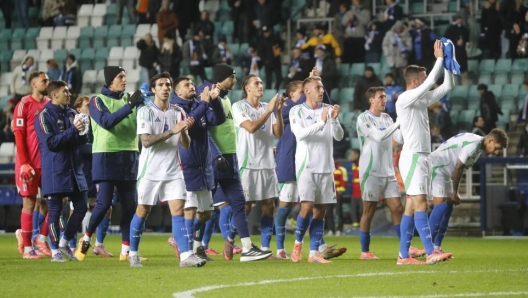For a nation synonymous with footballing glory, the prospect of another World Cup without Italy feels like an unwelcome recurring nightmare. After the heartbreak of missing the 2018 and 2022 tournaments, the Azzurri once again find themselves on the treacherous playoff path. This isn`t just about qualification; it`s about restoring pride, silencing doubts, and proving that the European champions of 2021 still belong on the grandest stage. The journey ahead is anything but straightforward, fraught with historical anxieties and the raw pressure of do-or-die encounters.

The Playoff Gauntlet: A Familiar, Unwanted Road
The sentiment echoing across Italy is clear: “Il bello viene ora.” – “The good part comes now.” But for many, this isn`t an exclamation of joy; it`s a resigned acknowledgement that the real challenge, the one filled with peril, has only just begun. Italy`s qualification group saw them comfortably dispatch weaker opponents, albeit sometimes with unexpected struggles (a 5-4 thriller against Israel, for instance, remains etched in memory). However, their encounter with the only truly strong rival, Norway, ended in a resounding defeat, sealing their fate as playoff contenders.
While a minuscule, theoretical chance for direct qualification remains (contingent on a Norwegian stumble and flawless Italian performances), all eyes are firmly fixed on the March playoffs. This brutal format demands perfection: a semi-final followed by a potential final, both single-leg knockout matches. The opponents, though perhaps theoretically weaker, are anything but trivial. The ghosts of past playoff eliminations – Sweden in 2017, North Macedonia in 2022 – lurk in the shadows, ready to remind Italy that superiority on paper means little in the crucible of a knockout game. Potential final destinations like Scotland, Slovakia, Albania, or Hungary promise hostile environments where winning will be anything but easy.
Glimmers of Hope Amidst Defensive Worries
Recent performances have offered a much-needed morale boost, particularly from the attacking front. In a recent match against Estonia, all three designated strikers – Kean, Retegui, and the promising Esposito (dubbed “the new Vieri” with a healthy dose of Italian hyperbole) – found the net. Against Israel, it was the Italian-Argentinian Mateo Retegui who truly stepped up, earning and converting a penalty before sealing the match with a superb goal. These offensive displays suggest a newfound potency that was sorely missing in previous campaigns.
Yet, the celebration is tempered by a discerning eye. The heroics of goalkeeper Gianluigi Donnarumma in crucial moments – both at 0-0 and with a narrow lead – highlight an ongoing concern: the defensive solidity. While Italy boasts world-class defenders, the collective defensive phase clearly requires fine-tuning. One can only imagine the conversations behind closed doors: “Yes, the goals are lovely, but can we avoid making Donnarumma perform miracles every other minute?”
Gattuso`s Pragmatic Touch: A Return to Basics
Enter Gennaro Gattuso, the coach whose name alone conjures images of grit and determination. He has instilled a sense of “normality and pragmatism” into the squad, a refreshing antidote to the tactical overthinking that sometimes plagues national teams. His decisions are simple, logical, and born of necessity. Faced with a dearth of reliable wingers or top-tier attacking midfielders, Gattuso has embraced a dual-striker system, deploying players like Kean and Retegui (with Raspadori and Esposito as alternatives) who thrive in central areas and know where the goal is. It’s common sense, deployed with a steely resolve. The question, however, remains: will common sense be enough?

Talent Abounds, But Can it Conquer History?
Despite the recent disappointments, a bedrock of optimism persists, fueled by the sheer quality within the Italian squad. Donnarumma, arguably the world`s best goalkeeper, anchors the team. Bastoni and Calafiori are international-level defenders, while Barella and Tonali remain among Europe`s strongest midfielders. Upfront, the options are indeed excellent. Beyond the established stars, a strong supporting cast includes Dimarco, Politano, Di Lorenzo, Mancini, with emerging talents like Buongiorno and Scalvini knocking on the door.
Italy might not be “great” in the same vein as some legendary past teams, nor are they as “small” as results sometimes suggest or as the collective self-flagellation of the Italian football public implies. The potential is undeniable. But the path to the World Cup is not merely a test of skill; it is a battle against historical trauma, against the crushing weight of expectation, and against the inherent unpredictability of single-elimination football. America awaits, arms open, as it did for Russia and Qatar. This time, however, Italy must ensure they actually arrive. The last World Cup match played by the Azzurri feels like a lifetime ago – over eleven years, to be precise. To call that “too long” is, frankly, an understatement. The drama, for better or worse, is just beginning.







